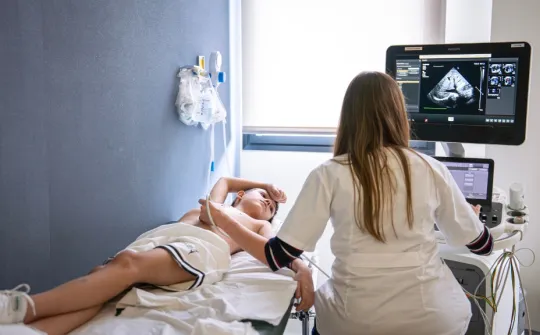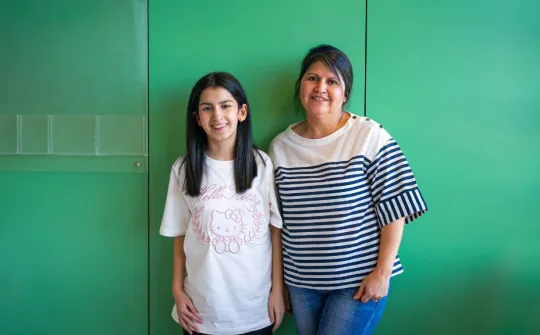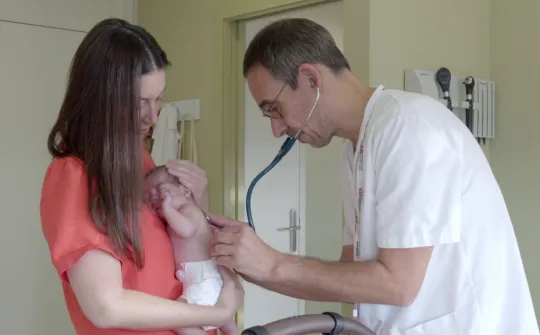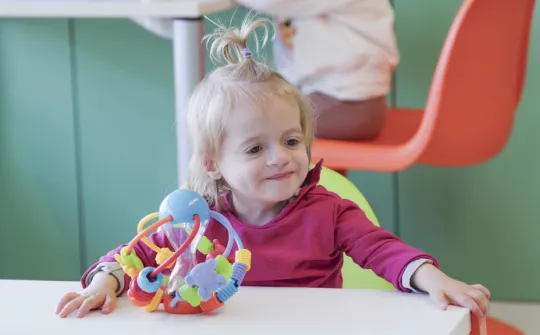‘Vocation is being motivated to learn how to provide care, to always keep learning and to research’
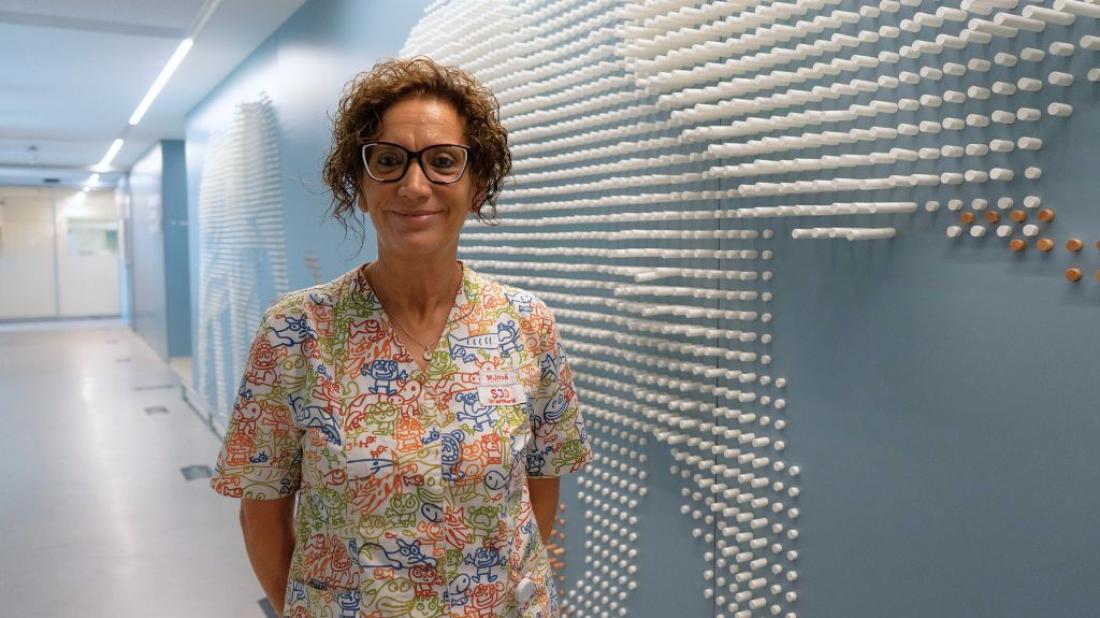
María José Troyano, Head of Nursing in the Neonatology Department, tells us about her work with the young patients she treats and their families, and everything that a 35-year career in the field entails.
In her career, María José Troyano has witnessed all manner of changes in the profession and in the Neonatology Department when it comes to caring for newborns—from premature babies born at 23 weeks to full-term infants with a complex disease requiring admission to a level three neonatal unit. Today we sit down with her to discuss how her specialism has changed and her experience of this ever-changing field.
To what extent is vocation significant in your field?
We normally associate healthcare with having a deep vocation or calling, because healthcare workers are in close contact with people from very complicated walks of life, who are sick or in pain, but that isn't always the case. Plus, nursing was originally closely linked to the care provided by women and religious groups who didn't need any kind of education to help the sick, but this has changed radically.
The most significant transformation that has happened is that nurses have taken the act of caregiving and moulded it into something that can be reviewed and debated scientifically. Yes, you must be interested in the field, but vocation is being motivated to learn how to provide care, to always keep learning and to research.
How did you become interested in neonatology?
In my academic years, I didn't focus on pediatrics. My first real contact with it was when I began working in a pediatric hospital, and the patients had me hooked from the get-go. From there, I started learning more about pediatrics, and not long after, I specialised in neonatology, where I've continued working for the last 35 years of my career.
How did you get started at the SJD Barcelona Children's Hospital?
I studied in Andalusia, but my inner adventurer brought me to Barcelona, and that’s how I got started at the SJD Barcelona Children’s Hospital. I remember my early days in the hospital very fondly, with the hospital's values slowly melding with my own as I saw the work my colleagues did and from what I took in when learning about neonatal care techniques.
What surprised you most in those initial years at the hospital?
Perhaps what I found most surprising was how both families and hospital staff were treated. I soon felt very much part of the team, part of a huge family. The way you're treated makes you feel like part of something bigger.
In the world of neonatology, what really captivated me was the strength of these newborns and premature babies. Being such small, defenseless things but being able to withstand complicated operations, how they just cling to life…
‘I remember my early days in the hospital very fondly, with the hospital's values slowly melding with my own as I saw the work my colleagues did’
Let’s come back to more recent experiences. Are there any experiences as Head of Nursing in the Neonatology Department that you would say stand out?
Designing a new unit with new facilities you aren't used to is a huge task. Moving from open neonatal units to other more compartmentalised ones, where not only the needs of the newborn are taken into account, but also the needs of their families and of the staff themselves is also very challenging.. These developments really flipped the script, where staff are there at the foot of the bed and families are truly heard and supported during the entire process.
What other changes were triggered by this new unit?
At a complex time due to the lack of nurses worldwide in the middle of the COVID-19 pandemic, this meant that more staff was needed. It was very hard to find qualified personnel at that time. To bring on these new staff members, we had to train them and help them learn the essentials needed to treat such a complex patient profile.
Are there any changes to the field itself that you've experienced over the years?
How we provide care has changed. Technological progress in recent years and professional specialisation have afforded premature babies and newborns with severe diseases a higher chance of survival.
A care model that focuses on the development of the newborn and on their family allows the baby's still-developing brain to get to where it needs to be and it also reduces the emotional impact on families seeing their child admitted to the ICU. Our care focuses on both the newborn and their family, considering them as one single unit. We do so by involving parents in the care of their child, making the family part of the newborn's treatment.
Have any other aspects of your day-to-day changed over the years?
The organisation of nursing teams on shift and working in compartmentalised rooms means we have to work in pairs. We try to pair a more experienced nurse with a newer nurse to help with training and learning. Caring for premature babies requires two people: while one treats the baby, the other deals with moving and handling.
The increased number of professionals on the unit has made communication between teams more difficult, so we've had to find strategies to offset this. We've used many tools to try to facilitate communication: info boards, patient distribution panels, whiteboards for ‘Good News’ indicators.
‘The ever-changing field of neonatology means neonatal nurses never stop learning’
You mentioned kangaroo care. What does that entail?
It involves skin-to-skin contact between the newborn and the mother or father. It's important they do this for at least two hours per day. It has been proven to have benefits for the baby's brain development. It stabilises their heart rate, oxygen saturation, better regulates their body temperature, strengthens the mother-child bond and increases breastmilk production, and it also helps reduce stress in the baby.
It also has benefits for the family, as parents feel actively involved in their child's care. They feel useful, that they can do something to help their child get better, and it reduces feelings of guilt that many parents feel when their child is born prematurely.
What is your experience with training for actively practicing nurses?
At first, when I worked night shift, I would sometimes come across a new respirator or a new monitor and I wouldn't know how they worked. So I thought to myself that something had to change. Everything happens so quickly and it’s constantly changing in neonatal nursing. There are also tons of factors that can change from week to week and based on the neonatal patient's weight.
The ever-changing field of neonatology means neonatal nurses never stop learning. In the SJD Barcelona Children's Hospital Neonatology Department, we have an annual training event, ‘Nursing Modules’, which the whole team attends. At this event, we agree on and consolidate standard procedures, and we have a monthly simulation workshop that we hold in our dedicated simulation room in the unit.
We look into the incident log, identifying areas for improvement in our daily practice so we can schedule training sessions to learn new skills relevant to the care needs that arise. Training is basic in such complex units with such a high degree of variability and technology.
Now let’s talk about the future. What will the challenges be for your department in the coming years?
One of the main challenges we’ll have to face in neonatal nursing is learning to interpret newborn behaviour: figuring out what's going on with them and adapting our care to the patient's needs. In other words, personalising their care.
Another challenge will be educating families and involving them in their child's care, making them the primary caregivers. They should be a part of the interdisciplinary team taking care of their baby, being kept informed of the process, their baby's health and the goals that have been set out at all times, as well as being involved in any decision-making processes concerning their child.
These two aspects will also help us offer better quality care and help humanise these complex, technology-oriented healthcare units.
What advice would you give someone studying nursing who wants to get into neonatology?
My main piece of advice would be not to rush straight into complex, technical knowledge. First of all, you have to start with the basics of neonatal care. Learn how to get to know the patient, interpret their behaviour, help educate the family, get them involved in their child's care, encourage kangaroo care and breastfeeding, learn how to recognise pain, stress, etc. Once you know all of that, then you can look into the more technical aspects of complex neonatal care and become a real expert in the field.
